高中英语人教版选修8 Unit 5 Meeting your ancestors Grammar 现在完成进行时 课件 (共43张PPT)
文档属性
| 名称 | 高中英语人教版选修8 Unit 5 Meeting your ancestors Grammar 现在完成进行时 课件 (共43张PPT) | 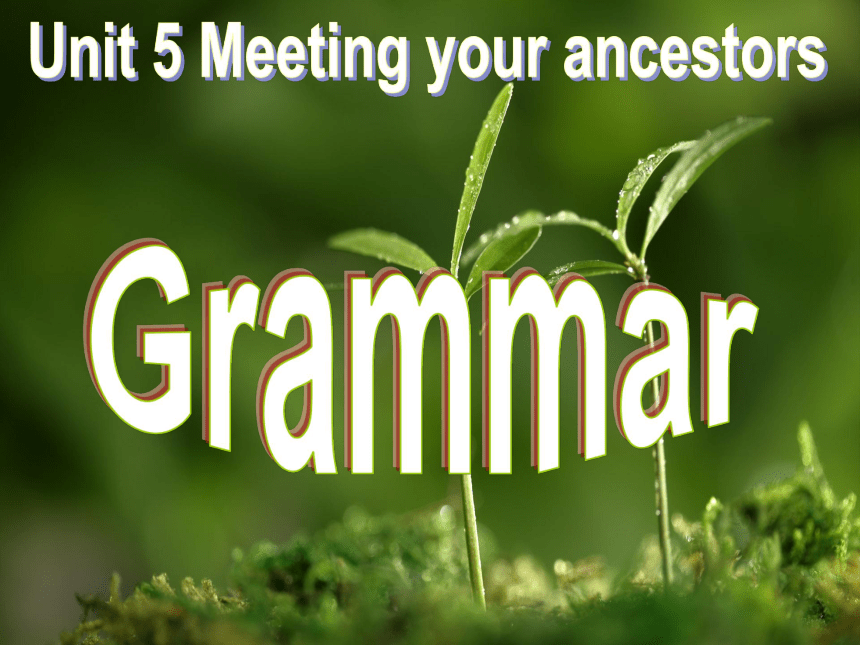 | |
| 格式 | zip | ||
| 文件大小 | 889.9KB | ||
| 资源类型 | 教案 | ||
| 版本资源 | 人教版(新课程标准) | ||
| 科目 | 英语 | ||
| 更新时间 | 2017-11-20 15:48:00 | ||
图片预览

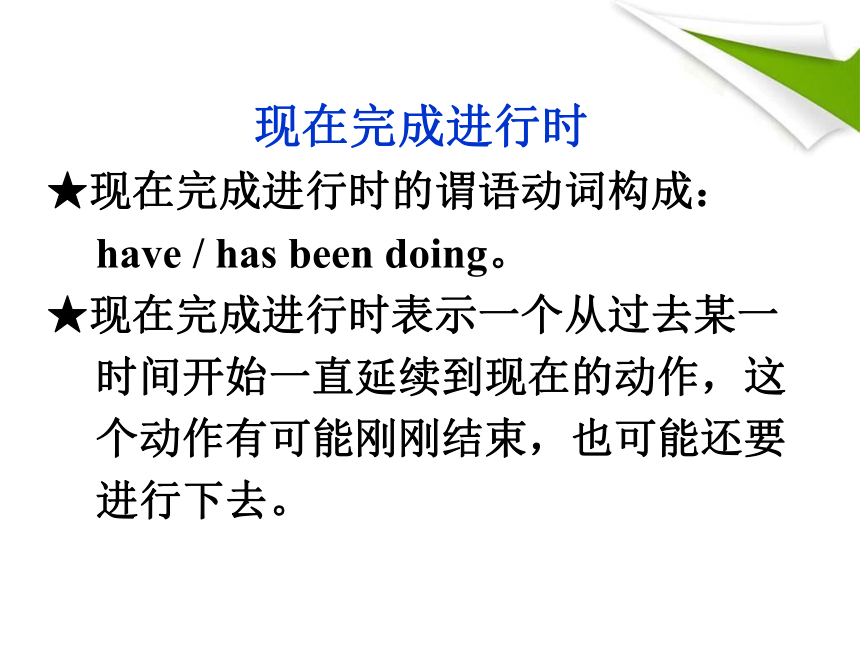
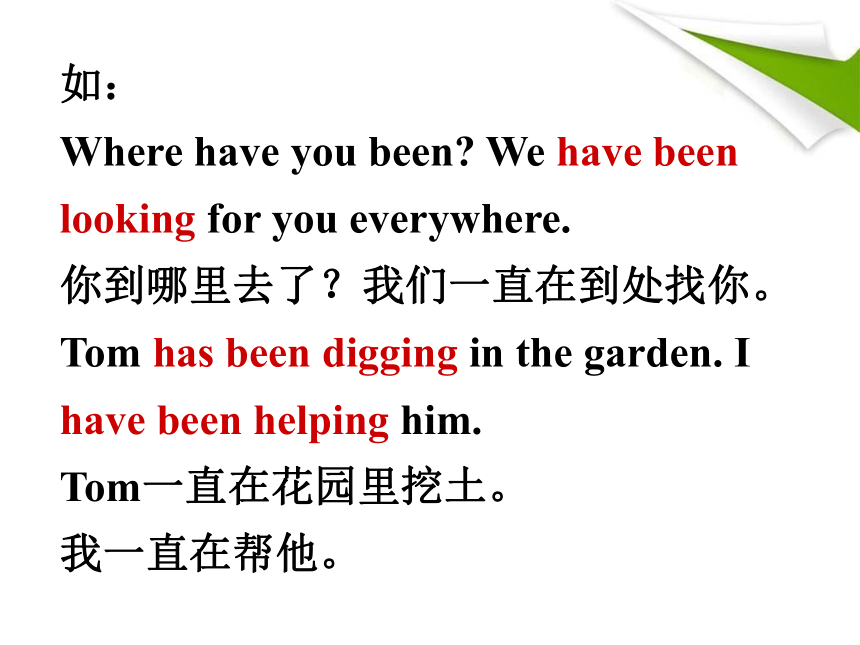
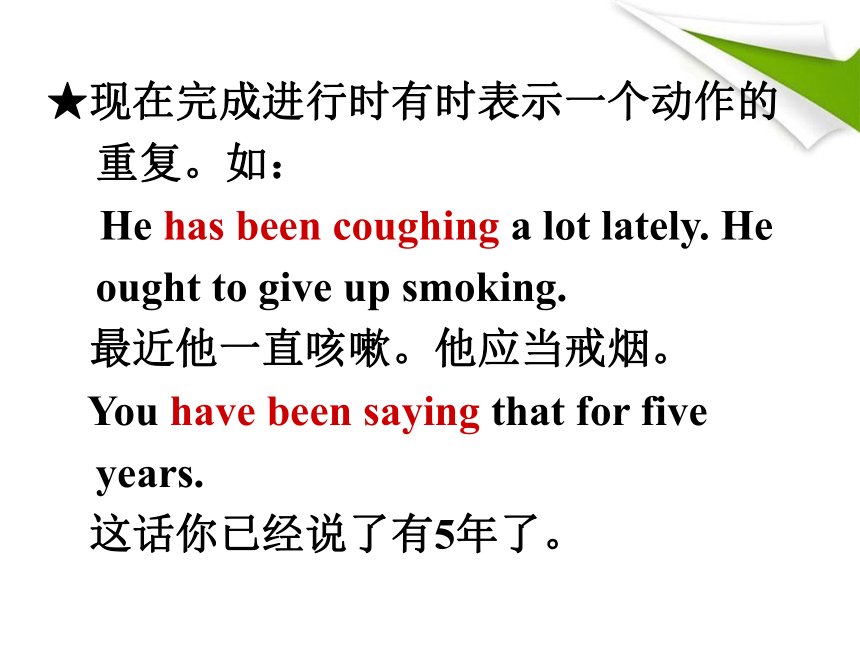
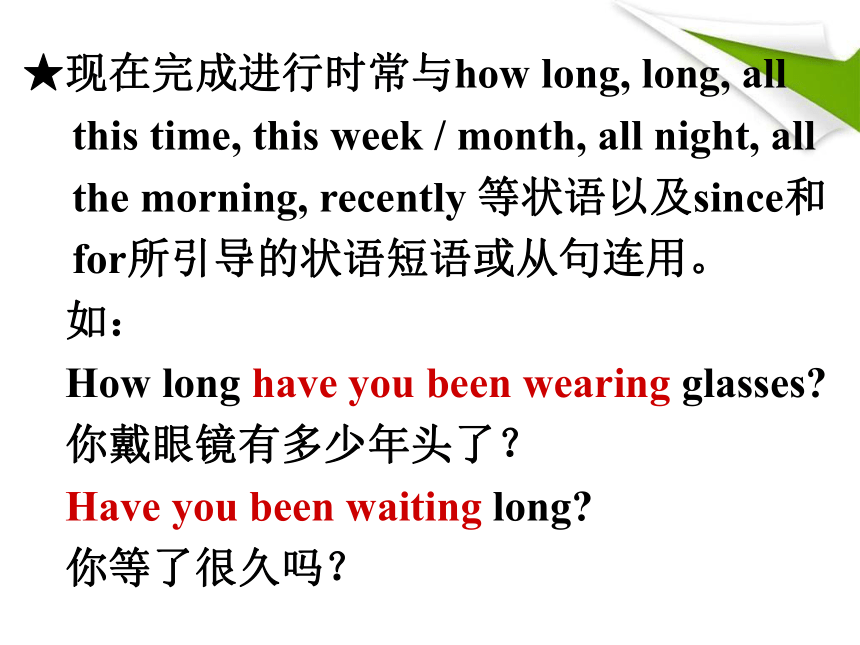
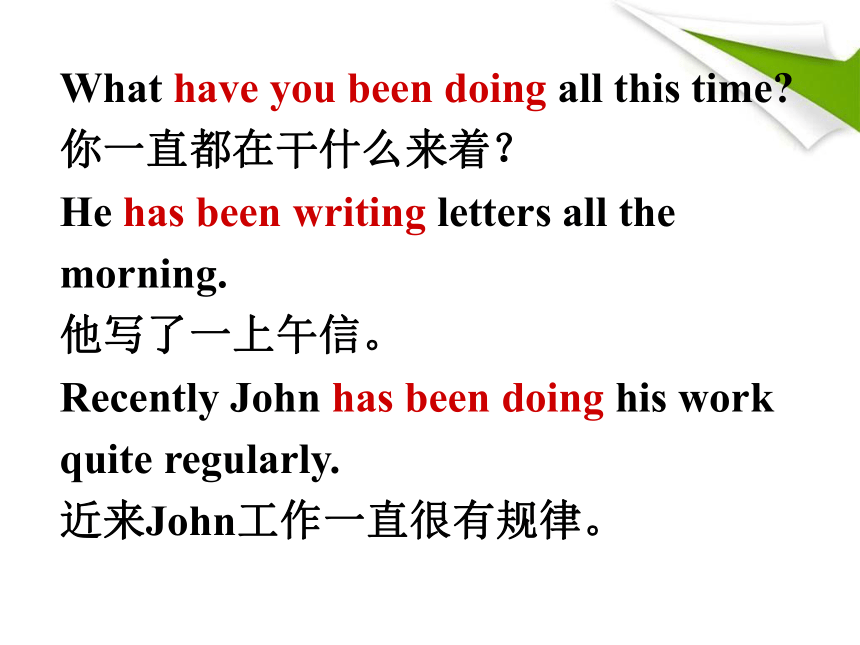
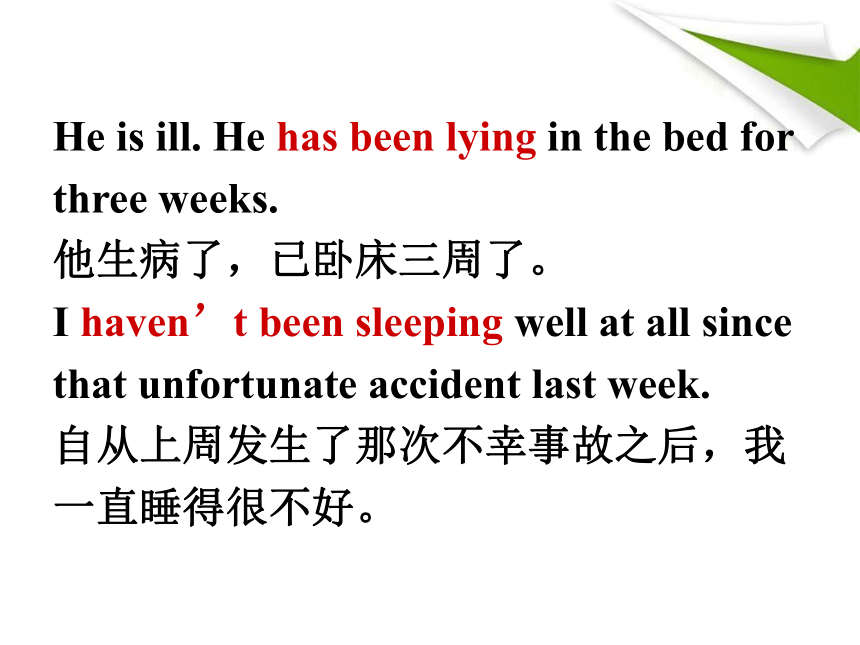
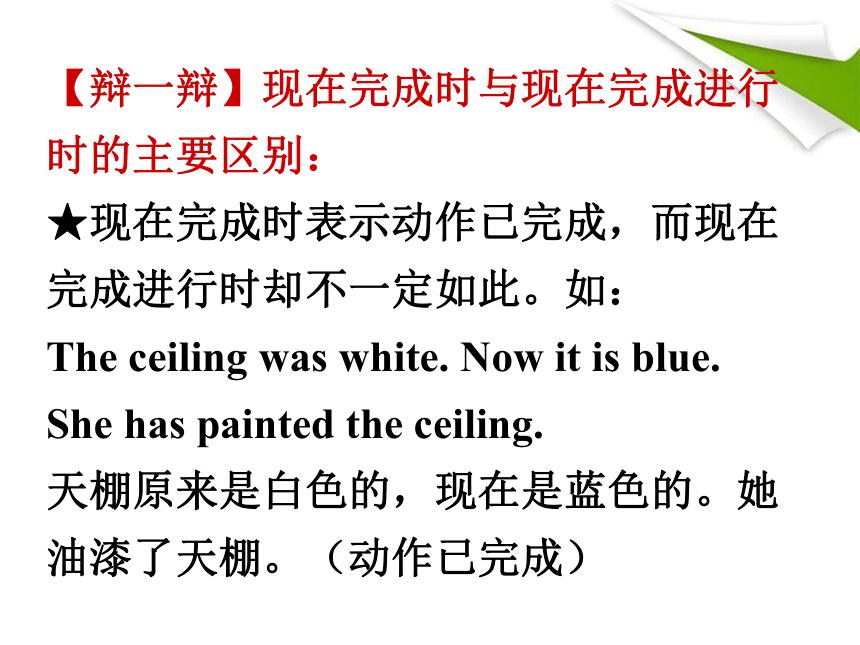
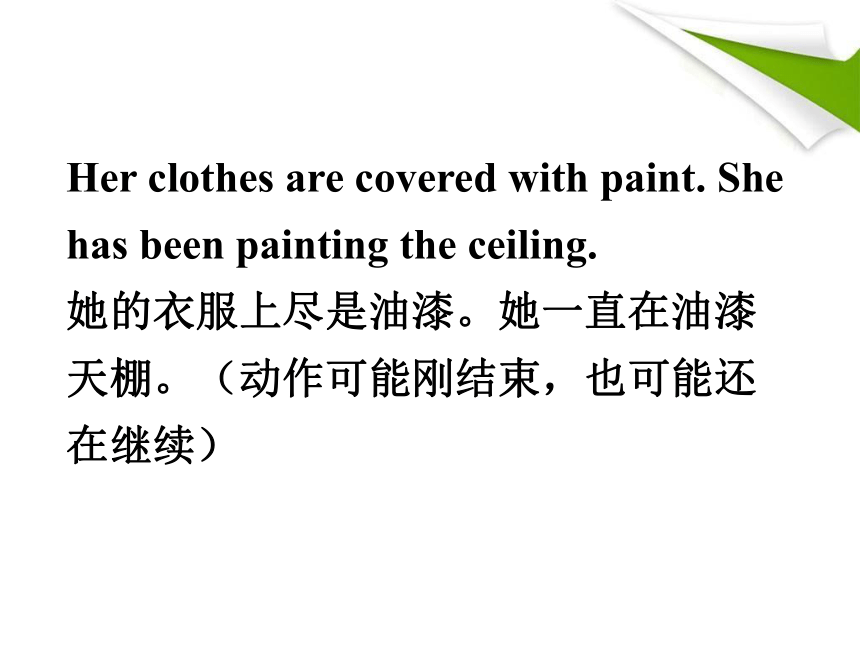


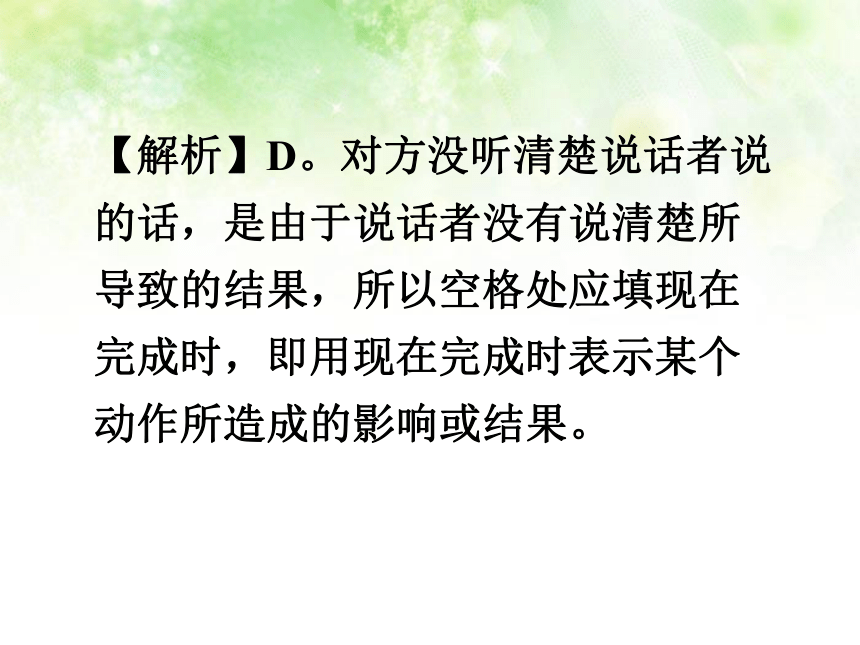
文档简介
课件43张PPT。GrammarUnit 5 Meeting your ancestors现在完成进行时
★现在完成进行时的谓语动词构成:have / has been doing。
★现在完成进行时表示一个从过去某一时间开始一直延续到现在的动作,这个动作有可能刚刚结束,也可能还要进行下去。如:
Where have you been? We have been
looking for you everywhere.
你到哪里去了?我们一直在到处找你。
Tom has been digging in the garden. I
have been helping him.
Tom一直在花园里挖土。
我一直在帮他。★现在完成进行时有时表示一个动作的重复。如:
He has been coughing a lot lately. He ought to give up smoking.
最近他一直咳嗽。他应当戒烟。
You have been saying that for five years.
这话你已经说了有5年了。★现在完成进行时常与how long, long, all this time, this week / month, all night, all the morning, recently 等状语以及since和for所引导的状语短语或从句连用。
如:
How long have you been wearing glasses?
你戴眼镜有多少年头了?
Have you been waiting long?
你等了很久吗?What have you been doing all this time?
你一直都在干什么来着?
He has been writing letters all the
morning.
他写了一上午信。
Recently John has been doing his work
quite regularly.
近来John工作一直很有规律。He is ill. He has been lying in the bed for
three weeks.
他生病了,已卧床三周了。
I haven’t been sleeping well at all since
that unfortunate accident last week.
自从上周发生了那次不幸事故之后,我
一直睡得很不好。【辩一辩】现在完成时与现在完成进行时的主要区别:
★现在完成时表示动作已完成,而现在完成进行时却不一定如此。如:
The ceiling was white. Now it is blue. She has painted the ceiling.
天棚原来是白色的,现在是蓝色的。她油漆了天棚。(动作已完成)Her clothes are covered with paint. She has been painting the ceiling.
她的衣服上尽是油漆。她一直在油漆天棚。(动作可能刚结束,也可能还在继续)★许多静态动词通常用于现在完成时而不用于现在完成进行时。如:
I have known him for years.
我已经认识他好几年了。
The strike has lasted six months.
这次罢工已持续了六个月。高考链接1. — I’m sorry, but I don’t quite follow you. Did you say you wanted to return on September 20?
— Sorry, I ________ myself clear. We want to return on October 20.
A. hadn’t made?????B. wouldn’t make?????????
C. don’t make??????????? D. haven’t made【解析】D。对方没听清楚说话者说的话,是由于说话者没有说清楚所导致的结果,所以空格处应填现在完成时,即用现在完成时表示某个动作所造成的影响或结果。2. When you are home, give a call to let me know you ________ safely.
A. are arriving?????? B. have arrived?????????????
C. had arrived?????????D. will arrive
【解析】B。根据句子本身已有的时态可知,过去完成时had arrived不能选;再根据常识,说话人应该是叫对方“已经”到家后才打电话报平安,故选现在完成时。3. Up to now, the program ________ thousands of children who would otherwise have died.
A. would save??????B. saves??????????????????????
C. had saved????????D. has saved【解析】D。短语up to now的意思是“到现在为止”,指从过去某时开始持续到现在的一段时间,通常与现在完成时连用。如:Her life has run smoothly up to now. 她的生活到目前仍一帆风顺。Up to now, the work has been easy. 到现在为止这工作还算容易。4. For many years, people ________ electric cars. however, making them has been more difficult than predicted. A. had dreamed of
B. have dreamed of???????
C. dreamed of?????????????
D. dream of【解析】B。根据句意和句中的时态has been可知,空格处不可能填过去时态,故可排除A和C;比较B和D,B为现在完成时,与句中的for many years(多年来)相吻合,故选B。5. — When shall we restart our business?
— Not until we ________ our plan.
A. will finish????? B. are finishing????????????
C. are to finish?????D. have finished【解析】D。由于until引导的是时间状语从句,所以不能直接使用将来时态,由此可排除A;再根据句意和常识可知,人们通常是先制定计划,然后付诸实施,故空格处填现在完成时比较符合句子语境。6. — We’ve spent too much money recently.
— Well, it isn’t surprising. Our friends and relatives ________ around all the time.
A. are coming???????? B. had come???????????????
C. were coming?????????D. have been coming 【解析】D。现在完成时的基本用法是从过去一直持续到现在的动作或状态。根据句意可知,正是因为最近一直有朋友和亲戚来访,所以导致花钱较多。7. I’m tired out. I ________ all afternoon and I don’t seem to have finished anything.
A. shopped???????????? B. have shopped??????????
C. had shopped????D. have been shopping【解析】D。根据句中的am和don’t seem可知,句子谈的是现在的情况,故可排除过去时态A和C;又因为“很累”是因为“整个下午一直在购物”导致的,故用选D在意思上更与语境吻合。8. — Why, Jack, you look so tired!
— Well, I ________ the house and I must finish the work tomorrow.
A. was painting? B. will be painting?????????
C. have painted??????D. have been painting【解析】D。现在完成进行时表示从过去一直持续到现在的动作。在此题中,由于“一直在刷油漆”,所以才导致“看上去非常疲惫”,故选D最符合句意。9. Mother wanted to be a good provider, a role she ________ since her marriage to father.
A. shoulders????????? B. shouldered???????????????
C. is shouldering? D. has been shouldering
【解析】D。根据空格后的since可知,此处谈论的是从过去一直持续到现在的情况,故用现在完成进行时最合适。10. Joseph ________ to evening classes since last month, but he still can’t say “What’s your name?” in Russian.
A. has been going???? B. went?????????????????????
C. goes????????????????????? D. has gone【解析】A。根据句中的since可知,空格处应填完成时态,故可排除B和C;根据句意,空格处填现在完成进行时比填现在完成时更合适,因为它更强调“一直在做某事”。 The Present Perfect Tense
现在完成时: 基本用法
现在完成时表结果, 他的动作发生在过去, 但是对现在有影响, 而这种影响却往往是说话人的兴趣所在。现在完成时跨越两个时间, 一个是过去, 另一个是现在。e.g. 我从1975年起就学英语。
I have studied English since 1975.
自12世纪以来, 中国就使用彩色印刷了。
They have done color printing in
China since the 12th century. Present Perfect Continuous Tense
现在完成进行时: 基本用法
1) 强调时间的持续性。如:
电话响了差不多一分钟, 为什么没人接?
The telephone has been ringing for almost a minute. Why doesn’t someone answer it?2) 表重复。叙述从过去某时到现在或最近已在重复的动作。如:
最近天气变化无常, 我时常感冒。
The weather has been changeable lately; I’ve been having a lot of colds.
3) 有感彩。如:
今天真是一个多事之日。
Too much has been happening today.现在完成进行时和现在完成时的比较:
A. 未完结性
I’ve cleaned the windows.
我把窗户擦干净了。
I’ve been cleaning the windows.
我擦窗户来着。(可能窗户尚未擦完) B. 短暂性
现在完成时与现在完成进行时都可以表示延续至今的状态, 但完成进行时常表示短暂性。
A. They have lived in New York.
B. They have been living in New
York.
句A具有长期性, 而句B具有短暂性。C. 刚完结性
与现在完成时相比, 现在完成进行时有时可以表示刚刚完结的动作。有时它是现在事件的直接原因, 或者是得出结论的证据。如:
我的手很脏, 我在油汽车来着。
My hands are dirty. I’ve been painting the car.
你的眼睛又红又肿, 你是不是哭来着?
Your eyes are red and puffy. Have you been crying?D. 连续性或重复性
现在完成进行时常常用于表示延续至今的连续性或重复性动作。如:
Jim have been phoning Jenny every night for the several month.
All these days he has been writing articles to our magazine.结论: 现在完成进行时主要用于表示
A. 过去开始而且现在仍在进行的动作。
B. 过去开始, 现在刚刚停止的动作。
C. 现在看到其直接结果的动作。
现在完成时主要用于表示已经完成的动作及其与现在的关系。 In pairs, take turns to read the statement and turn it into a question using the present perfect continuous tense. The words in brackets may help you. (P41)
e.g. S1: Mrs. Smith learned to drive
three years ago. (how long)
S2: How long have you been
driving, Mrs. Smith?1. Sam has just finished learning to fly an airplane on a six-month course. (how long)
How long have you been learning to fly an airplane, Sam?
2. He swam till he felt very tired. He has just stepped out of the swimming pool. (how long)
How long have you been swimming?3. Sally and Zhou Xin have been busy all
day. (what)
What have you been doing, Sally and
Zhou Xin?
4. They have argued with each other for
years about the best way to grow
potatoes. (what)
What have you been arguing about for
years?5. Jiao Yang uses a particular kind of washing powder and his clothes have always been clean and soft. (what)
Jiao Yang, what kind of washing powder have you been using that makes your clothes so clean and soft?
1. Learn useful words and expressions by heart and practice them.
2. Finish Ex. 1 and 2 on pages 40, 79 and 80.HomeworkThank you!
★现在完成进行时的谓语动词构成:have / has been doing。
★现在完成进行时表示一个从过去某一时间开始一直延续到现在的动作,这个动作有可能刚刚结束,也可能还要进行下去。如:
Where have you been? We have been
looking for you everywhere.
你到哪里去了?我们一直在到处找你。
Tom has been digging in the garden. I
have been helping him.
Tom一直在花园里挖土。
我一直在帮他。★现在完成进行时有时表示一个动作的重复。如:
He has been coughing a lot lately. He ought to give up smoking.
最近他一直咳嗽。他应当戒烟。
You have been saying that for five years.
这话你已经说了有5年了。★现在完成进行时常与how long, long, all this time, this week / month, all night, all the morning, recently 等状语以及since和for所引导的状语短语或从句连用。
如:
How long have you been wearing glasses?
你戴眼镜有多少年头了?
Have you been waiting long?
你等了很久吗?What have you been doing all this time?
你一直都在干什么来着?
He has been writing letters all the
morning.
他写了一上午信。
Recently John has been doing his work
quite regularly.
近来John工作一直很有规律。He is ill. He has been lying in the bed for
three weeks.
他生病了,已卧床三周了。
I haven’t been sleeping well at all since
that unfortunate accident last week.
自从上周发生了那次不幸事故之后,我
一直睡得很不好。【辩一辩】现在完成时与现在完成进行时的主要区别:
★现在完成时表示动作已完成,而现在完成进行时却不一定如此。如:
The ceiling was white. Now it is blue. She has painted the ceiling.
天棚原来是白色的,现在是蓝色的。她油漆了天棚。(动作已完成)Her clothes are covered with paint. She has been painting the ceiling.
她的衣服上尽是油漆。她一直在油漆天棚。(动作可能刚结束,也可能还在继续)★许多静态动词通常用于现在完成时而不用于现在完成进行时。如:
I have known him for years.
我已经认识他好几年了。
The strike has lasted six months.
这次罢工已持续了六个月。高考链接1. — I’m sorry, but I don’t quite follow you. Did you say you wanted to return on September 20?
— Sorry, I ________ myself clear. We want to return on October 20.
A. hadn’t made?????B. wouldn’t make?????????
C. don’t make??????????? D. haven’t made【解析】D。对方没听清楚说话者说的话,是由于说话者没有说清楚所导致的结果,所以空格处应填现在完成时,即用现在完成时表示某个动作所造成的影响或结果。2. When you are home, give a call to let me know you ________ safely.
A. are arriving?????? B. have arrived?????????????
C. had arrived?????????D. will arrive
【解析】B。根据句子本身已有的时态可知,过去完成时had arrived不能选;再根据常识,说话人应该是叫对方“已经”到家后才打电话报平安,故选现在完成时。3. Up to now, the program ________ thousands of children who would otherwise have died.
A. would save??????B. saves??????????????????????
C. had saved????????D. has saved【解析】D。短语up to now的意思是“到现在为止”,指从过去某时开始持续到现在的一段时间,通常与现在完成时连用。如:Her life has run smoothly up to now. 她的生活到目前仍一帆风顺。Up to now, the work has been easy. 到现在为止这工作还算容易。4. For many years, people ________ electric cars. however, making them has been more difficult than predicted. A. had dreamed of
B. have dreamed of???????
C. dreamed of?????????????
D. dream of【解析】B。根据句意和句中的时态has been可知,空格处不可能填过去时态,故可排除A和C;比较B和D,B为现在完成时,与句中的for many years(多年来)相吻合,故选B。5. — When shall we restart our business?
— Not until we ________ our plan.
A. will finish????? B. are finishing????????????
C. are to finish?????D. have finished【解析】D。由于until引导的是时间状语从句,所以不能直接使用将来时态,由此可排除A;再根据句意和常识可知,人们通常是先制定计划,然后付诸实施,故空格处填现在完成时比较符合句子语境。6. — We’ve spent too much money recently.
— Well, it isn’t surprising. Our friends and relatives ________ around all the time.
A. are coming???????? B. had come???????????????
C. were coming?????????D. have been coming 【解析】D。现在完成时的基本用法是从过去一直持续到现在的动作或状态。根据句意可知,正是因为最近一直有朋友和亲戚来访,所以导致花钱较多。7. I’m tired out. I ________ all afternoon and I don’t seem to have finished anything.
A. shopped???????????? B. have shopped??????????
C. had shopped????D. have been shopping【解析】D。根据句中的am和don’t seem可知,句子谈的是现在的情况,故可排除过去时态A和C;又因为“很累”是因为“整个下午一直在购物”导致的,故用选D在意思上更与语境吻合。8. — Why, Jack, you look so tired!
— Well, I ________ the house and I must finish the work tomorrow.
A. was painting? B. will be painting?????????
C. have painted??????D. have been painting【解析】D。现在完成进行时表示从过去一直持续到现在的动作。在此题中,由于“一直在刷油漆”,所以才导致“看上去非常疲惫”,故选D最符合句意。9. Mother wanted to be a good provider, a role she ________ since her marriage to father.
A. shoulders????????? B. shouldered???????????????
C. is shouldering? D. has been shouldering
【解析】D。根据空格后的since可知,此处谈论的是从过去一直持续到现在的情况,故用现在完成进行时最合适。10. Joseph ________ to evening classes since last month, but he still can’t say “What’s your name?” in Russian.
A. has been going???? B. went?????????????????????
C. goes????????????????????? D. has gone【解析】A。根据句中的since可知,空格处应填完成时态,故可排除B和C;根据句意,空格处填现在完成进行时比填现在完成时更合适,因为它更强调“一直在做某事”。 The Present Perfect Tense
现在完成时: 基本用法
现在完成时表结果, 他的动作发生在过去, 但是对现在有影响, 而这种影响却往往是说话人的兴趣所在。现在完成时跨越两个时间, 一个是过去, 另一个是现在。e.g. 我从1975年起就学英语。
I have studied English since 1975.
自12世纪以来, 中国就使用彩色印刷了。
They have done color printing in
China since the 12th century. Present Perfect Continuous Tense
现在完成进行时: 基本用法
1) 强调时间的持续性。如:
电话响了差不多一分钟, 为什么没人接?
The telephone has been ringing for almost a minute. Why doesn’t someone answer it?2) 表重复。叙述从过去某时到现在或最近已在重复的动作。如:
最近天气变化无常, 我时常感冒。
The weather has been changeable lately; I’ve been having a lot of colds.
3) 有感彩。如:
今天真是一个多事之日。
Too much has been happening today.现在完成进行时和现在完成时的比较:
A. 未完结性
I’ve cleaned the windows.
我把窗户擦干净了。
I’ve been cleaning the windows.
我擦窗户来着。(可能窗户尚未擦完) B. 短暂性
现在完成时与现在完成进行时都可以表示延续至今的状态, 但完成进行时常表示短暂性。
A. They have lived in New York.
B. They have been living in New
York.
句A具有长期性, 而句B具有短暂性。C. 刚完结性
与现在完成时相比, 现在完成进行时有时可以表示刚刚完结的动作。有时它是现在事件的直接原因, 或者是得出结论的证据。如:
我的手很脏, 我在油汽车来着。
My hands are dirty. I’ve been painting the car.
你的眼睛又红又肿, 你是不是哭来着?
Your eyes are red and puffy. Have you been crying?D. 连续性或重复性
现在完成进行时常常用于表示延续至今的连续性或重复性动作。如:
Jim have been phoning Jenny every night for the several month.
All these days he has been writing articles to our magazine.结论: 现在完成进行时主要用于表示
A. 过去开始而且现在仍在进行的动作。
B. 过去开始, 现在刚刚停止的动作。
C. 现在看到其直接结果的动作。
现在完成时主要用于表示已经完成的动作及其与现在的关系。 In pairs, take turns to read the statement and turn it into a question using the present perfect continuous tense. The words in brackets may help you. (P41)
e.g. S1: Mrs. Smith learned to drive
three years ago. (how long)
S2: How long have you been
driving, Mrs. Smith?1. Sam has just finished learning to fly an airplane on a six-month course. (how long)
How long have you been learning to fly an airplane, Sam?
2. He swam till he felt very tired. He has just stepped out of the swimming pool. (how long)
How long have you been swimming?3. Sally and Zhou Xin have been busy all
day. (what)
What have you been doing, Sally and
Zhou Xin?
4. They have argued with each other for
years about the best way to grow
potatoes. (what)
What have you been arguing about for
years?5. Jiao Yang uses a particular kind of washing powder and his clothes have always been clean and soft. (what)
Jiao Yang, what kind of washing powder have you been using that makes your clothes so clean and soft?
1. Learn useful words and expressions by heart and practice them.
2. Finish Ex. 1 and 2 on pages 40, 79 and 80.HomeworkThank you!
